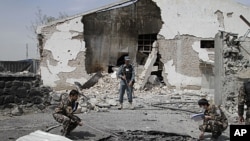Insurgents killed at least seven people and wounded 17 others, mostly children, in Kabul Wednesday, just two hours after U.S. President Barack Obama left Afghanistan following a brief, unannounced visit.
A suicide car bomber and militants disguised as women attacked a heavily secured compound housing hundreds of international workers on the eastern outskirts of the capital. Afghan security forces swarmed the area and regained control after hours of gunfire.
The Taliban claimed responsibility, saying it was in response to the U.S. president's visit and promised more attacks as they launch their usual "spring offensive" across the country. U.S. Ambassador Ryan Crocker joined NATO and the United Nations' mission in Afghanistan in condemning the attack.
Hours before the attack, President Obama was at Bagram Airbase just outside Kabul to sign a strategic pact with his Afghan counterpart, Hamid Karzai, and deliver an election-year message on the anniversary of al-Qaida leader Osama bin Laden's death.
In televised remarks broadcast to Americans late Tuesday, Mr. Obama told the American people that the Afghan war is winding down. He reaffirmed the transition in Afghanistan with U.S. combat troops completing their withdrawal and Afghans taking full security control of their country by 2014.
The president said the United States will continue to support counterterrorism and training efforts in Afghanistan, but "will not build permanent bases" in the country. He also said Washington's goal is to destroy al-Qaida and "not to build a country in America's image, or to eradicate every vestige of the Taliban," objectives that would "require many more years, many more dollars and many more American lives."
The U.S.-Afghan strategic agreement pledges American aid for Afghanistan for at least a decade after the withdrawal of the last U.S. troops. The two sides also have pledged to negotiate within the next year a separate deal outlining any U.S. troop presence beyond 2014.
Around 90,000 U.S. troops currently serve in Afghanistan. Some 33,000 American forces will have pulled out of Afghanistan by September of this year.
Ambassador Crocker said Wednesday the pact is the "clearest statement" that the U.S. is committed to Afghanistan through 2024.
Senior U.S. officials say the pact is part of a larger strategy to stabilize Afghanistan and defeat extremist forces in the region. Another key element of the strategy involves Afghan-led reconciliation with the Taliban, which the officials said can move forward if the group breaks its ties with al-Qaida.
President Obama for the first time publicly acknowledged that his administration has been in direct discussions with the Taliban in pursuit of a "negotiated peace." He said many insurgent leaders and fighters have shown an interest in reconciliation, but that they must cut ties with al-Qaida, renounce violence and abide by Afghan laws in order to take part in the peace process.




